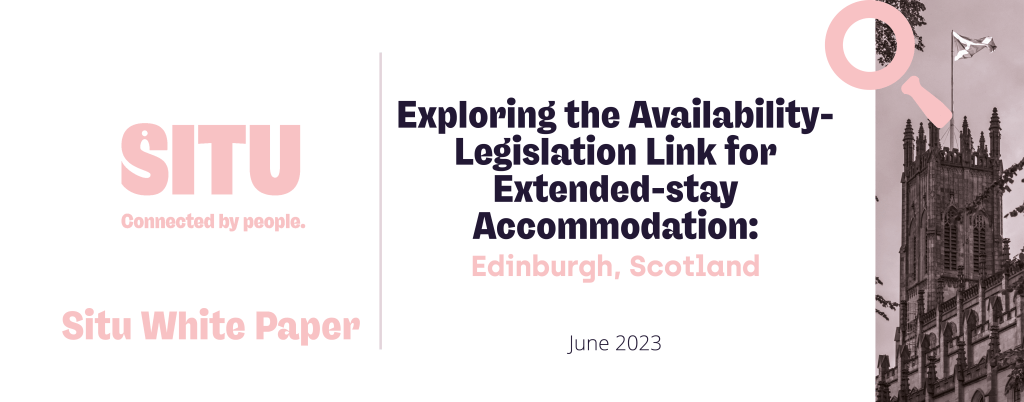Edinburgh is a city with strict regulations on short-term lets that are likely to have a significant effect on the extended stay sector. The Scottish Government’s intention was to regulate the market and ensure adequate safety standards as in the private rental sector.

New regulations around short-term lets came into force in Scotland in October 2022, with applications made through the local council where the property is located. However, a six-month delay has been announced for existing operators to apply for a short-term let licence in Scotland.
Existing owners have until 1 October 2023 to apply for a licence, while all new short-term let properties must now have a licence before booking1. The City of Edinburgh introduced its own scheme in 2022, which includes a ‘control area’2. This means that the use of an entire dwelling that is not a principal home as a short-term let requires planning permission. As with the rest of Scotland, new operators must have both a licence and planning permission, while existing operators have until October 2023.
There are concerns that the new rules in Scotland are overly-complicated and expensive and, as in other cities, will act as a disincentive to non-professionals dealing in single-property vacation lets. Serviced apartments are excluded from the same rules that govern the short-term rental market, as are aparthotels. However, the effect on extended-stay accommodation is significant in terms of loss of diversity in operators’ inventories and potentially higher prices.
As one Edinburgh accommodation partner says, “A considerable amount of our portfolio will be affected by the regulation changes and will therefore no longer be available for short-term rental. As such, we have had to diversify to allow for longer-term rentals as well as focusing more on onboarding multi-unit-/ aparthotel-style properties which would allow for short-term licensing. In the process, travellers’ choice for accommodation will be massively reduced, consequently forcing up rates.”
Many feel that the new rules are overly complicated and expensive; and are puzzled as to how concerns about health and safety, the impact of short-stay rentals on local communities, and housing have morphed into regulations that threaten the short-stay sector itself. Another Edinburgh accommodation partner states that their company, “Will lose about 90%, at least, of our accommodation options for short lets.”
Indeed, research shows that since the pandemic there has already been a reduction in the number of individuals renting out single vacation lets; and since aparthotels are exempt from the ruling, this business model may offer a tempting choice for international investors.
In Edinburgh, the regulations are likely to impact large events such as the Edinburgh Festival Fringe in August, when the city’s population doubles. Availability is already at a premium, and there are correspondingly high accommodation prices for both guests and performers. Considering the number of people who to Edinburgh for this event and during peak tourist season, this may discourage tourists from coming to the city – in turn having an impact on other businesses and the economy of Edinburgh as a whole. The new regulations will only add to the pressure on Edinburgh’s already stretched short-stay inventory during peak season.
As in other cities, strict rules around individual short-stay lets are likely to lead to a loss of product diversity overall – including the extended-stay sector – in an iconic location where many travellers value staying in a home in a local neighbourhood. Across Scotland as a whole, countryside and remote locations are likely to be particularly affected, resulting in a lack of available places to stay for travellers and impacting the local economy of these areas.
[1] The Scottish Government. ‘How to apply for a short-term let licence’.
[2] The City of Edinburgh Council. ‘Edinburgh to become first short-term let control area in Scotland’.
Legal notice
The content of this white paper and subsequent blog posts is only accurate as of the date of the white paper’s release and will constantly evolve due to the ever-changing nature of the local property market. For the most recent update please contact your sales representative at Situ.
Do you need a stay in Edinburgh? Do browse our selection of great Situ serviced apartments in Edinburgh, or pick up the phone and give one of our friendly accommodation specialists a call at +44 (0)1392 690 079.

